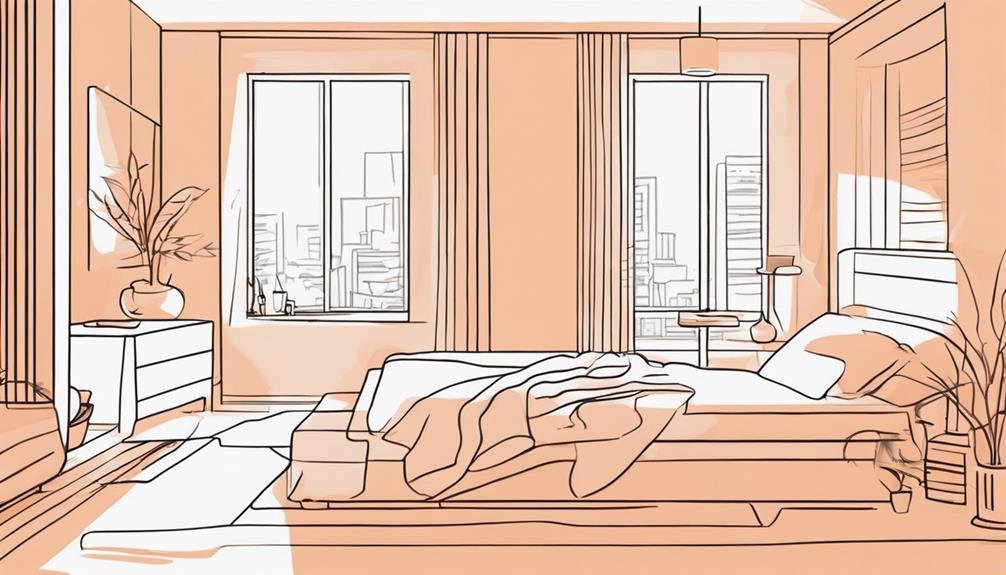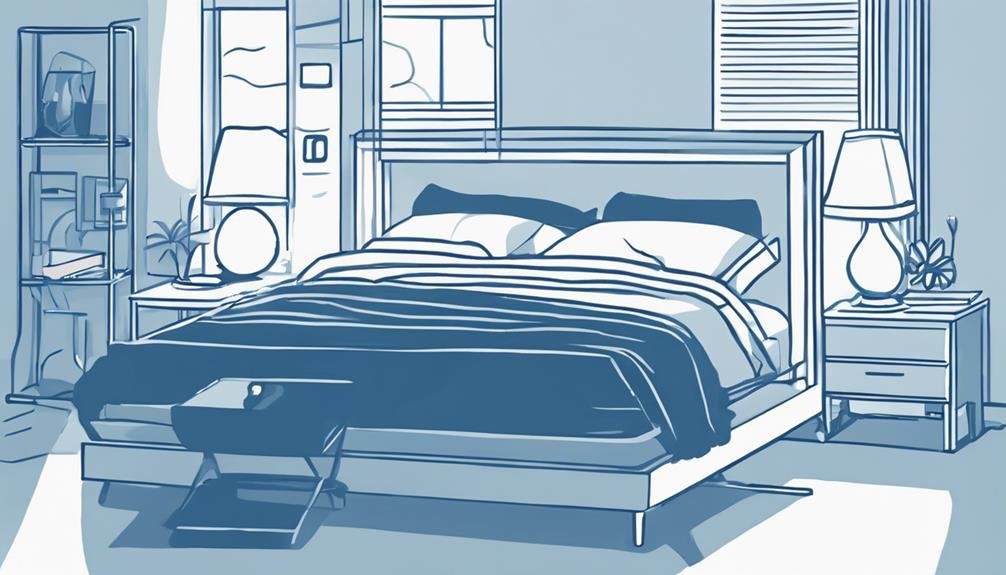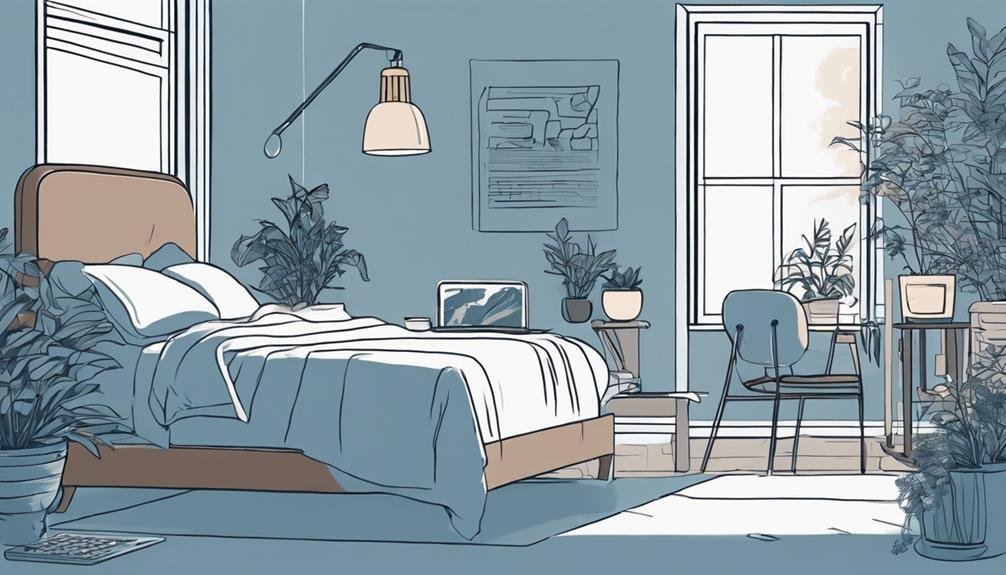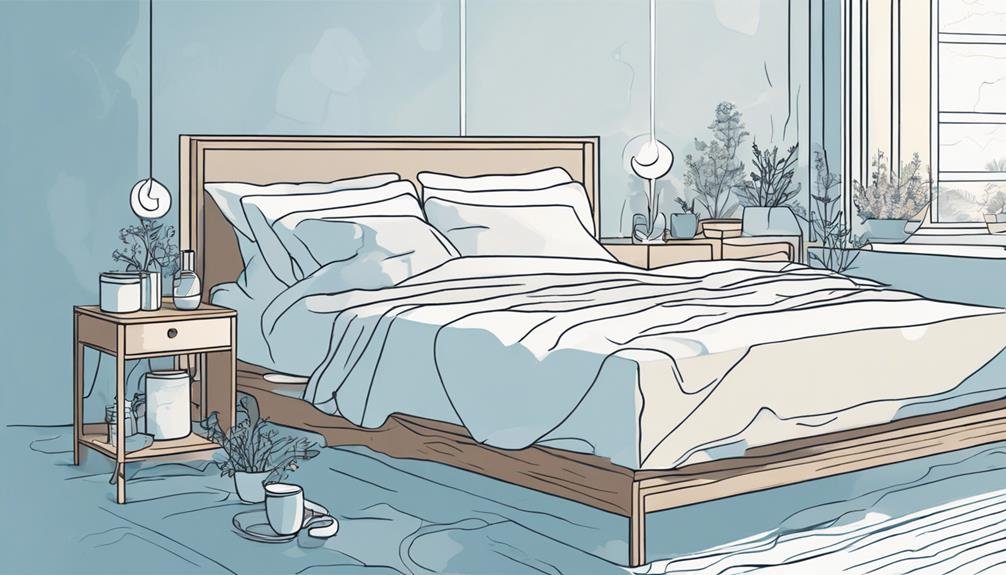7 Blue Light Blocking Techniques for Better Rest
To improve your rest, start by adjusting your screen settings. Enable night mode or use a blue light filter on your devices to minimize disruption. Consider wearing blue light glasses to enhance sleep quality and reduce eye strain. Aim to limit screen time, especially two hours before bedtime. Create a sleep-friendly environment by dimming lights and keeping your room cool. Establish a calming evening routine with activities like meditation or gentle yoga. You might also explore natural supplements like melatonin or chamomile. With these techniques, you'll pave the way for better sleep; there's even more to explore beyond this!
Key Takeaways
- Enable night mode or blue light filters on devices to reduce blue light exposure in the evening.
- Use blue light blocking glasses to filter harmful light and enhance sleep quality.
- Set daily screen time limits, aiming to disconnect two hours before bedtime.
- Create a calming evening routine, incorporating dim lights and relaxing activities like reading or meditation.
Understanding Blue Light Impact
Blue light greatly affects your sleep patterns by disrupting melatonin production and making it harder to fall asleep. When you're exposed to screens from phones, tablets, or computers, especially in the evening, your brain thinks it's still daytime. This confusion can lead to insomnia or poor-quality sleep.
You might notice that after late-night scrolling, you struggle to drift off or wake up feeling groggy. Over time, this disruption can accumulate, affecting your mood, concentration, and overall health.
It's crucial to recognize how blue light interferes with your natural circadian rhythm. Understanding this impact can motivate you to make changes that promote better sleep hygiene, ultimately improving your daily life and well-being.
Adjusting Screen Settings

Adjusting your screen settings can considerably reduce blue light exposure and help you sleep better at night. Most devices offer a night mode or blue light filter feature, which you can easily enable. This setting shifts the color temperature of your display to warmer tones, minimizing blue light emission.
You can also manually adjust brightness levels; lowering your screen brightness in the evening not only reduces eye strain but also limits blue light exposure.
For computers, consider using software like f.lux that automatically adjusts your screen's color temperature based on the time of day.
Utilizing Blue Light Glasses
Wearing blue light glasses can considerably reduce your exposure to harmful blue light, especially during evening screen time. These specialized lenses filter out blue light emitted by devices, helping you unwind and prepare for sleep. By incorporating blue light glasses into your routine, you'll likely experience improved sleep quality and reduced eye strain.
They can enhance your focus while working late. You'll feel less fatigued after prolonged screen use. They're available in various styles to suit your taste. Many options are lightweight and comfortable for all-day wear. Some glasses even come with added UV protection.
Incorporating blue light glasses into your daily life is a simple yet effective way to promote better rest and overall well-being.
Implementing Screen Time Limits

Setting screen time limits can greatly enhance your ability to unwind and improve your sleep quality.
Start by deciding how much time you'll spend on screens each day, especially in the evening. Aim for a cutoff time, ideally two hours before bedtime, to give your mind a chance to relax.
Use apps or built-in features on your devices to track and restrict your usage. Communicate these limits to your family or friends to foster a supportive environment.
You might find it helpful to replace screen time with relaxing activities, like reading or meditating.
Creating a Sleep-Friendly Environment
A sleep-friendly environment is essential for ensuring you get the restful night you deserve. By creating a space conducive to sleep, you can promote relaxation and improve your overall sleep quality.
Here are some tips to help you design that perfect atmosphere:
- Dim the lights an hour before bedtime.
- Keep your bedroom cool, ideally between 60-67°F (15-19°C).
- Invest in blackout curtains to block out external light.
- Use white noise machines or calming sounds to drown out disruptive noises.
Incorporating these elements into your sleep space will help you unwind and drift off more easily, ensuring you wake up refreshed and ready to tackle the day.
Incorporating Evening Routines

In addition to creating a sleep-friendly environment, incorporating a calming evening routine can greatly enhance your ability to unwind and prepare for a restful night.
Start by setting a specific time to begin winding down. Limit screens and dim the lights to signal your body that it's time to relax.
Engage in calming activities like reading a book, practicing gentle yoga, or taking a warm bath.
Consider journaling to release any lingering thoughts or stress from your day. You might also try meditation or deep breathing exercises to center your mind.
Exploring Natural Supplements

Exploring natural supplements can offer effective solutions for improving sleep quality and reducing the impacts of blue light exposure. By incorporating these into your routine, you might find it easier to unwind and achieve restful sleep.
Here are some options to contemplate:
- Melatonin: Helps regulate your sleep-wake cycle.
- Magnesium: Promotes muscle relaxation and reduces stress.
- Valerian Root: Known for its calming effects and ability to enhance sleep quality.
- Chamomile: A soothing herbal tea that can ease anxiety.
Integrating these supplements can help you combat the effects of blue light and improve your overall sleep experience.
Just remember to consult with a healthcare professional before starting any new supplement.
Questions
Can Kids Use Blue Light Blocking Glasses Safely?
Yes, kids can use blue light blocking glasses safely. They're designed to reduce eye strain and improve comfort while using screens. Just verify the glasses fit well and are appropriate for your child's age and usage.
Do Blue Light Filters Work on All Screens?
'A stitch in time saves nine.' While blue light filters can reduce glare and blue light emission, their effectiveness varies across different screens. You'll find some work better than others, so choose wisely for best results.
What Is the Best Time to Stop Using Screens?
To improve your sleep, it's best to stop using screens at least one to two hours before bedtime. This allows your body to wind down and prepares you for a more restful night's sleep.
Are There Specific Foods That Help Reduce Blue Light Effects?
Oh sure, nibbling on kale and carrots will magically shield you from blue light's wrath! While no specific foods exist, antioxidants found in fruits and veggies might help your eyes and overall health. Enjoy your snack!
How Do I Know if My Blue Light Glasses Are Effective?
To know if your blue light glasses are effective, observe any improvements in your sleep quality and eye strain. If you feel less tired after using them, they're likely doing their job well.
Conclusion
By embracing these blue light blocking techniques, you're not just protecting your eyes; you're reclaiming your sleep and enhancing your overall well-being.
Imagine drifting off with ease, free from the distractions of screens that once held you captive.
As you adjust your habits and environment, you'll find that restful nights lead to energizing days.
So, why wait? Start implementing these strategies today and watch as your quality of sleep transforms into a rejuvenating experience.

